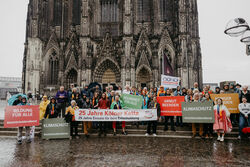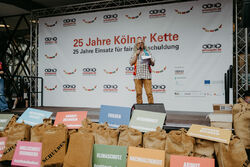26.07.2024

In heavy rain, and despite an official thunderstorm warning, activists met in front of the Cologne Cathedral.

Rev Helmut Müller was part of the human chain 25 years ago. Today, he represents UEM within the alliance. Both photos by: Daria Lanzet / erlassjahr.de
"I was there. In 1999, together with some members of the Markus parish in Oberhausen, we joined the human chain around the centre of Cologne," says Helmut Müller, coordinator of the Regional Service of the United Evangelical Mission (UEM). He represents the UEM on the Council of the Debt Relief Coalition "Jubilee Germany" (erlassjahr.de in German) in which 500 organisations from all over Germany have joined forces. Their goal for 25 years: debts must be handled responsibly. Especially the debts of states.
1999: Debt to countries
On 19 June 1999, around 35,000 people formed a human chain around the centre of Cologne to mark the G8 summit, the so-called "Cologne Chain". With their combined efforts, civil society succeeded in convincing the G8 to cancel the debts of highly indebted countries. For the first time, a mechanism was created to help countries that owe too much to other countries deal with this situation. This makes 1999 a milestone in the history of financial policy.
2024: Debt to private institutions
Today, there is a different problem: many countries, especially in the Global South, no longer have (only) debts to other countries, but to banks and other private institutions. There is currently no mechanism for dealing with over-indebtedness in this situation. This creates a paradoxical situation: individuals who can no longer pay their debts have the option of declaring bankruptcy. The same applies to companies. Only states are left at the mercy of their creditors.
Today, as in the past, Helmut Müller and his fellow campaigners believe that "it is the responsibility of Christians and our churches to work for the comprehensive cancellation of the debts of the countries of the Global South. More and more countries in the Global South are caught in a debt trap for which they are not responsible." This often leads to difficult situations: a state can then, for example, only spend money on interest payments, but hardly anything on public services. For example, Sri Lanka recently paid 70% of its state revenues in interest.
Civil society works
When the activists from "Jubilee Germany" commemorate the 25th anniversary of the Cologne Chain today, they do so in the knowledge of what they have already achieved. Kristina Rehbein, political coordinator at "Jubilee Germany", says of the changed situation: "One-off debt cancellations have not been able to overcome the underlying structural problems. What is needed today are real reforms of the international financial architecture, which is still dominated by creditors." People's living conditions are more important than the repayment of sovereign debt. This must finally be reflected in the financial architecture.
IBAN: DE45 3506 0190 0009 0909 08
SWIFT/BIC: GENODED1DKD
spenden@vemission.org
0202-89004-195
info@vemission.org
0202-89004-0
presse@vemission.org
0202-89004-135
CRDB BANK PLC / Branch 3319
Account# 0250299692300
Swift code: CORUTZTZ
Bank BNI
Account# 0128002447
Swift code: BNINIDJAMDN
info@vemission.org
presse@vemission.org